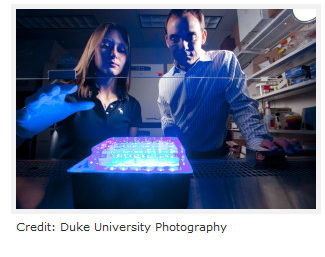

By Charles Gersbach, Assistant Professor, and Tom Katsouleas, Dean, Duke University's Pratt School of Engineering
Elaborate competitions to build the best robot or design cages to protect falling eggs have been a rite of passage for generations of engineering students. Today, there's a new contest with the same creativity and competitive spirit, but vastly more sophisticated projects--like mixing-and-matching bits of DNA to create new microorganisms that produce biofuels or costly medicines.

The International Genetically Engineered Machines (iGEM) competition challenges student teams to use cutting-edge tools from the new field of synthetic biology to design, build, and test genetically engineered organisms. This fall, 133 teams of students from universities from around the world participated, producing an incredible array of projects. Some engineered microorganisms to produce medicines, clean up environmental contaminants, or act as biosensors for toxins or other chemicals. Others created genetically engineered living board games or transformed otherwise stinky bacteria to smell like wintergreen. Our own Duke University iGEM team focused on engineering gene circuits in yeast to better understand how cells make decisions, such as whether to replicate or respond to an environmental stimulus; the circuits can also be used in biomanufacturing.
If these examples surprise you, you're not alone. As the New York Times observed, "iGEM has been grooming an entire generation of the world's brightest scientific minds to embrace synthetic biology's vision -- without anyone really noticing, before the public debates and regulations that typically place checks on such risky and ethically controversial new technologies have even started." But we think this kind of hands-on experimentation and experience is precisely the way to prepare the next generation of leaders who can help society reap the benefits and manage the risks of synthetic biology--and other fields, for that matter.
At a time when the discussion of the future of college education is largely focused on online teaching and massive open online courses (MOOCs), it is critical to recognize the importance of hands-on education that can only be provided in a dynamic research environment. As Matt Baron, a biomedical engineering student and member of the Duke iGEM team, says: "If I had simply studied synthetic biology but not participated in the iGEM competition, I would not appreciate the practical implementation of the theoretical concepts--or how synthetic biology can be used to solve complex problems across seemingly unrelated fields such as medicine, agriculture, manufacturing and computing. More importantly, I would have lost the opportunity to take ownership over a project along with my team members." By encouraging freedom and independence in project design and exposing students to a new and exciting field as it is developing, the iGEM competition provides a quality of education that clearly cannot be replicated through online teaching, but is critical in educating the next generation of scientists and engineers.
The iGEM competition also teaches participants the importance of considering broader implications of advances in synthetic biology, such as the safety and security of the engineered systems and ethical issues concerning genetic manipulation. All projects are supervised by university faculty mentors, and the iGEM competition stresses environmental and societal responsibility as primary judging criteria. Our iGEM team worked with Duke faculty in the Schools of Law and Public Policy to develop a report on intellectual property and synthetic biology, addressing concerns involving patenting of gene sequences and subsequent effects on basic research and the biotechnology industry. These students are not just learning science and engineering--they're being trained in aspects of philosophy, policy and business.
But synthetic biology is not just an academic exercise. The number of synthetic biology companies has tripled over the last four years, from 61 to 192. The global synthetic biology market was estimated to be worth $2.1 billion in 2012 and is expected to expand to $16.7 billion by 2018. At this rate, the development of this nascent field is rapidly outpacing the release of new textbooks or other conventional educational models--whereas the iGEM competition adapts at the speed of student creativity, providing a new model for training that's already proving its worth. Many successful iGEM projects have been published in peer-reviewed scientific journals, and several iGEM teams have even patented their inventions, creating opportunities to complement their science and engineering training with entrepreneurship experiences.
Educational paradigms must evolve to train the next generation of scientists and engineers, going beyond cultivating creativity and inventiveness to developing social consciousness and the mindset to face the grand challenges for the 21st century. The iGEM competition provides an excellent blueprint for how to achieve these goals by involving students not only in finding the right answers, but asking the right questions.
Visit XPRIZE at xprize.org, follow us on Facebook, Twitter and Google+, and get our Newsletter to stay informed.
This material published courtesy of Singularity University.
No comments:
Post a Comment